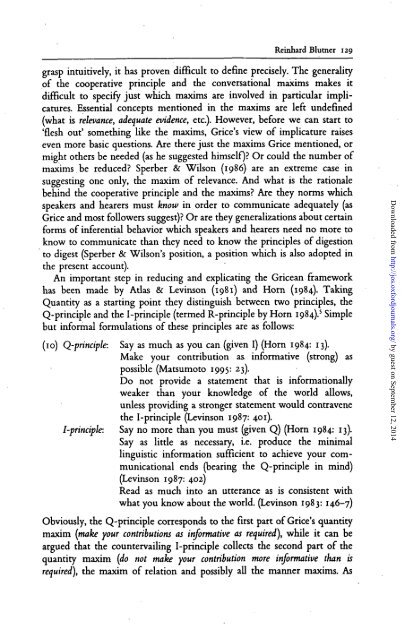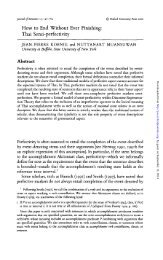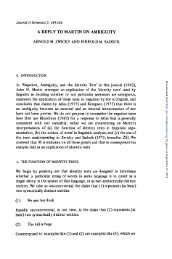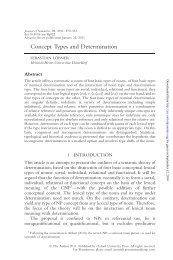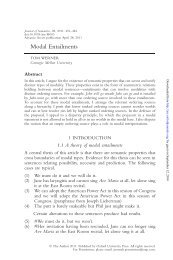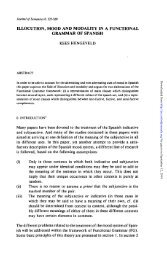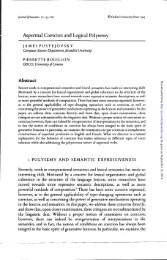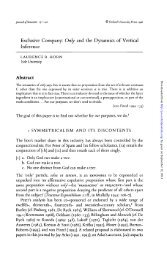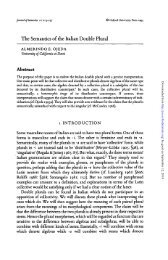Lexical Pragmatics - Journal of Semantics
Lexical Pragmatics - Journal of Semantics
Lexical Pragmatics - Journal of Semantics
You also want an ePaper? Increase the reach of your titles
YUMPU automatically turns print PDFs into web optimized ePapers that Google loves.
Reinhard Blutner 129grasp intuitively, it has proven difficult to define precisely. The generality<strong>of</strong> the cooperative principle and the conversational maxims makes itdifficult to specify just which maxims are involved in particular implicatures.Essential concepts mentioned in the maxims are left undefined(what is relevance, adequate evidence, etc.). However, before we can start to'flesh out' something like the maxims, Grice's view <strong>of</strong> implicature raiseseven more basic questions. Are there just the maxims Grice mentioned, ormight others be needed (as he suggested himself)? Or could the number <strong>of</strong>maxims be reduced? Sperber & Wilson (1986) are an extreme case insuggesting one only, the maxim <strong>of</strong> relevance. And what is the rationalebehind the cooperative principle and the maxims? Are they norms whichspeakers and hearers must know in order to communicate adequately (asGrice and most followers suggest)? Or are they generalizations about certainforms <strong>of</strong> inferential behavior which speakers and hearers need no more toknow to communicate than they need to know the principles <strong>of</strong> digestionto digest (Sperber & Wilson's position, a position which is also adopted inthe present account).An important step in reducing and explicating the Gricean frameworkhas been made by Atlas & Levinson (1981) and Horn (1984). TakingQuantity as a starting point they distinguish between two principles, theQ-principle and the I-principle (termed R-principle by Horn 1984).* Simplebut informal formulations <strong>of</strong> these principles are as follows:(10) Q-principle: Say as much as you can (given I) (Horn 1984: 13).Make your contribution as. informative (strong) aspossible (Matsumoto 1995: 23).Do not provide a statement that is informationallyweaker than your knowledge <strong>of</strong> the world allows,unless providing a stronger statement would contravenethe I-principle (Levinson 1987: 401).I-principle: Say no more than you must (given Q) (Horn 1984: 13).Say as little as necessary, i.e. produce the minimallinguistic information sufficient to achieve your communicationalends (bearing the Q-principle in mind)(Levinson 1987: 402)Read as much into an utterance as is consistent withwhat you know about the world. (Levinson 1983: 146-7)Obviously, the Q-principle corresponds to the first part <strong>of</strong> Grice's quantitymaxim (make your contributions as informative as required), while it can beargued that the countervailing I-principle collects the second part <strong>of</strong> thequantity maxim (do not make your contribution more informative than isrequired), the maxim <strong>of</strong> relation and possibly all the manner maxims. AsDownloaded from http://jos.oxfordjournals.org/ by guest on September 12, 2014


